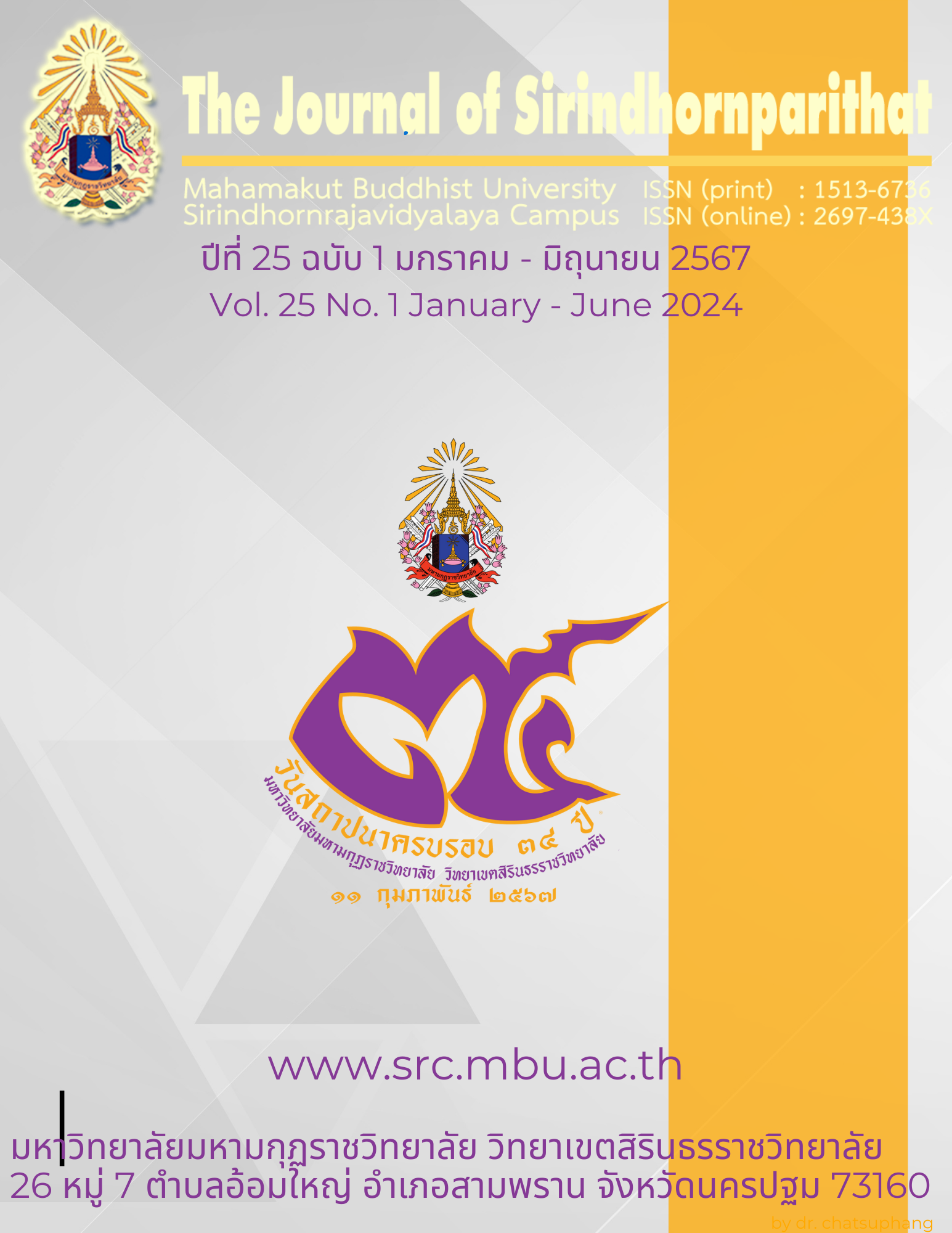Causal Factors Affecting Efficiency of Online Teaching during COVID 19 of Teachers at Muban Chombueng Rajabhat University
Keywords:
Causal Factors in Online Teaching, Effectiveness of Online TeachingAbstract
The research aimed to investigate: 1) The causal factors of online teaching during the Covid-19 pandemic for teachers at Muban Chombueng Rajabhat University. 2) The efficiency of online teaching during the Covid-19 pandemic for teachers at Muban Chombueng Rajabhat University. 3) The causal factors affecting the efficiency of online teaching during the Covid-19 pandemic. The study involved 239 participants, including teachers and students from 10 faculties, who completed a questionnaire in Google Form. Statistical analyses included percentage calculations, mean, standard deviation, and stepwise multiple regression analysis. The results revealed: 1) The overview of causal factors affecting online teaching during the Covid-19 pandemic showed a high level. The factors ranked from highest to lowest were teachers, media, information, students, infrastructure, technology, regulations, and teaching methods, with teaching methods falling in the middle range. 2) The overall efficiency of online teaching during the Covid-19 pandemic, as well as its aspects, were rated at a high level. The aspects, from highest to lowest, were learning management, learning achievement, learning atmosphere, satisfaction of the learners, and evaluation. 3) The causal factors affecting the efficiency of online teaching during the Covid-19 pandemic were found to be the overall causal factors and regulations. These factors entered the regression equation respectively. The predictive multiple correlation coefficient was 0.982, and the prediction coefficient (R^2) was 0.963. This indicates that the two variables together could predict the efficiency of online teaching for teachers at Muban Chombueng Rajabhat University during the Covid-19 pandemic with 96.30 percent accuracy. The standard error in prediction was 0.08162, demonstrating that both the overall causal factors and regulations significantly influence the efficiency of online teaching during the Covid-19 pandemic at Muban Chombueng Rajabhat University. The regression analysis equation can be represented as follows: Ŷtot = .285 + .764 (Xtot) + .302 (X9)
References
ฐิติรัตน์ นัยพัฒน์. (2560). การพัฒนาผลสัมฤทธิ์ทางการเรียนโดยใช้สื่อการเรียนการสอนวิชาการสร้างเว็บไซต์ ระดับประกาศนียบัตรวิชาชีพ (ปวช.) ชั้นปีที่ 3. กรุงเทพมหานคร: วิทยาลัยเทคโนโลยีอรรถวิทย์พณิชยการ.
มหาวิทยาลัยสุโขทัยธรรมาธิราช. (2564). การจัดการเรียนการสอนแบบออนไลน์. [ออนไลน์]. จากแหล่ง http: // www. google. com. สืบค้นเมื่อ 12 มิถุนายน 2564.
วไลพรรณ อาจารีวัฒนา. (2562). การศึกษาสภาพการจัดการเรียนการสอนออนไลน์ในสถานการณ์การแพร่ระบาดเชื้อไวรัสโคโรนาของนักศึกษาโครงการพิเศษ หลักสูตรบริหารธุรกิจมหาบัณฑิต. วิทยานิพนธ์หลักสูตรบริหารธุรกิจมหาบัณฑิต คณะบริหารธุรกิจ มหาวิทยาลัยรามคำแหง.
ศศิณัณฐ นาไทย. (2560). ปัจจัยที่ส่งผลต่อความตั้งใจในการเรียนปริญญาโทหลักสูตรการบริหารเทคโนโลยี รูปแบบออนไลน์. วิทยานิพนธ์หลักสูตรวิทยาศาสตรมหาบัณฑิต สาขาวิชาการบริหารเทคโนโลยี วิทยาลัยนวัตกรรม มหาวิทยาลัยธรรมศาสตร์.
Beerens, D. R. (2000). Evaluating Teachers for Professional Growth: Creating a Culture of Motivation and Learning. Thousand Oaks: Corwon Press.
Dence, M. (1980). Toward Defining the Role of CAI: A Review. Educational Technology, 20: 50-54.
Prenis, John. (1977). Running Press Glossary of Computer Terms. Dissertation Abstracts International. 49(4): 780-A.
Spencer, L. M., & Spencer, S. M. (1977). Competence at Work: Model for Superior Performance. New York: Wiley & Sons.

Downloads
Published
Issue
Section
License
Copyright (c) 2024 Mahamakut Buddhist University

This work is licensed under a Creative Commons Attribution-NonCommercial-NoDerivatives 4.0 International License.
บทความที่ได้รับการตีพิมพ์เป็นลิขสิทธิ์ของ มหาวิทยาลัยมหามกุฏราชวิทยาลัย วิทยาเขตสิรินธรราชวิทยาลัย
ข้อความที่ปรากฏในบทความแต่ละเรื่องในวารสารวิชาการเล่มนี้เป็นความคิดเห็นส่วนตัวของผู้เขียนแต่ละท่านไม่เกี่ยวข้องกับหาวิทยาลัยมหามกุฏราชวิทยาลัย วิทยาเขตสิรินธรราชวิทยาลัย และคณาจารย์ท่านอื่นๆในมหาวิทยาลัยฯ แต่อย่างใด ความรับผิดชอบองค์ประกอบทั้งหมดของบทความแต่ละเรื่องเป็นของผู้เขียนแต่ละท่าน หากมีความผิดพลาดใดๆ ผู้เขียนแต่ละท่านจะรับผิดชอบบทความของตนเองแต่ผู้เดียว



